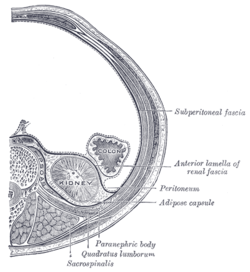Costovertebral angle
From Wikipedia, the free encyclopedia
| Costovertebral angle | |
|---|---|
 | |
| View of the human skeleton from the back; the costovertebral angle is marked. | |
| Latin | arcus costovertebralis |

Transverse section, showing the relations of the capsule of the kidney.
The costovertebral angle (Latin: arcus costovertebralis) is the acute angle formed on either side of the human back between the twelfth rib and the vertebral column.[1]
The kidney lies directly below this area, so is the place where, with percussion (Latin: sucussio renalis), pain is elicited when the person has kidney stones or kidney inflammation. The presence of pain is marked as a positive Murphy's punch sign or as costovertebral angle tenderness.[2]
References
- ↑ "Costovertebral Angle - Medical Definition". Lippincott Williams & Wilkins. Retrieved 13 June 2012.
- ↑ Musana KA, Yale SH (August 2005). "Murphy's Sign". Clin Med Res 3 (3): 132. PMC 1237152. PMID 16160065.
This article is issued from Wikipedia. The text is available under the Creative Commons Attribution/Share Alike; additional terms may apply for the media files.